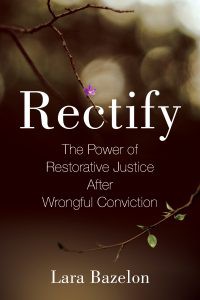
A Conversation with Lara Bazelon
Join Rectify author and former Innocence Project director Lara Bazelon and Marissa Bluestine for a discussion about restorative justice.
April 1, 2019
4:00 PM EDT
Duane Morris LLP Moot Court Room
Klein Hall • Temple University Beasley School of Law
In Rectify, author and law professor Lara Bazelon makes a powerful case for restorative justice when the person convicted of a crime is later exonerated. Join Lara on April 1st when she sits down with Pennsylvania Innocence Project Executive Director Marissa Bluestine to talk about what becomes possible when wrongfully convicted men and women and the crime victims whose lives have been upended come together for reconciliation and healing.
Copies of Rectify will be available for purchase at the event, and a reception with light refreshments will follow Lara’s remarks.

Lara Bazelon
Associate Professor, University of San Francisco School of Law
Lara Bazelon is a writer and associate professor at the University of San Francisco School of Law, where she is the director of the Criminal Juvenile Justice and Racial Justice Clinics. A 2016 MacDowell Fellow and a 2017 Mesa Refuge Langeloth Fellow, she is the former director of the Loyola Law School Project for the Innocent. Her writing has appeared in the New York Times, Atlantic, Washington Post, Politico, and Slate, where she is a contributing writer and has a long-running series about wrongful conviction cases. Learn more at larabazelon.com.
Watch Online
About Rectify

In Rectify, a former Innocence Project director and journalist Lara Bazelon puts a face to the growing number of men and women exonerated from crimes that kept them behind bars for years—sometimes decades—and that devastate not only the exonerees but also their families, the crime victims who mistakenly identified them as perpetrators, the jurors who convicted them, and the prosecutors who realized too late that they helped convict an innocent person. Movingly written and vigorously researched, Rectify takes to task the far-reaching failures of our criminal justice system and opens a window into a future where the power it yields can be used in pursuit of healing and unity rather than punishment and blame.
